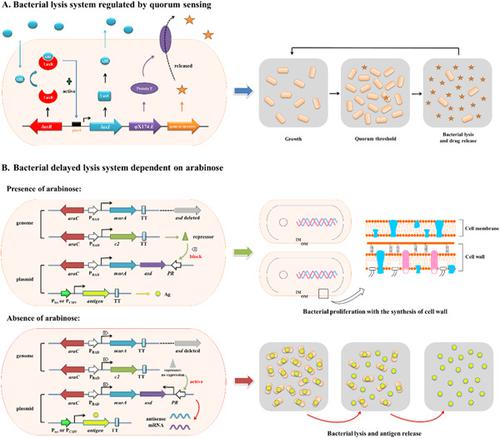当前位置:
X-MOL 学术
›
Biotechnol. Bioeng.
›
论文详情
Our official English website, www.x-mol.net, welcomes your
feedback! (Note: you will need to create a separate account there.)
New technologies in developing recombinant‐attenuated bacteria for cancer therapy
Biotechnology and Bioengineering ( IF 3.5 ) Pub Date : 2020-10-10 , DOI: 10.1002/bit.27596 Kang Liang 1 , Qing Liu 2 , Qingke Kong 1
Biotechnology and Bioengineering ( IF 3.5 ) Pub Date : 2020-10-10 , DOI: 10.1002/bit.27596 Kang Liang 1 , Qing Liu 2 , Qingke Kong 1
Affiliation

|
Cancer has always been a global problem, with more cases of cancer patients being diagnosed every year. Conventional cancer treatments, including radiotherapy, chemotherapy, and surgery, are still unable to bypass their obvious limitations, and developing effective targeted therapies is still required. More than one century ago, the doctor William B. Coley discovered that cancer patients had tumor regression by injection of Streptococcus bacteria. The studies of cancer therapy using bacterial microorganisms are now very widespread. In particular, the facultative anaerobic bacteria Salmonella typhimurium is widely investigated as it can selectively colonize different types of tumors, locally deliver various antitumor drugs, and inhibit tumor growth. The exciting antitumor efficacy and safety observed in animal tumor models prompted the well‐known attenuated Salmonella bacterial strain VNP20009 to be tested in human clinical trials in the early 21st century. Regrettably, no patients showed significant therapeutic effects and even bacterial colonization in tumor tissue was undetectable in most patients. Salmonella bacteria are still considered as a promising agent or vehicle for cancer therapy. Recent efforts have been focused on the generation of attenuated bacterial strains with higher targeting for tumor tissue, and optimization of the delivery of therapeutic antitumor cargoes into the tumor microenvironment. This review will summarize new technologies or approaches that may improve bacteria‐mediated cancer therapy.
中文翻译:

开发用于癌症治疗的重组减毒细菌的新技术
癌症一直是一个全球性问题,每年有更多的癌症患者被确诊。包括放疗、化疗和手术在内的常规癌症治疗仍无法绕过其明显的局限性,仍需要开发有效的靶向治疗。一个多世纪以前,William B. Coley 医生发现癌症患者通过注射链球菌使肿瘤消退。使用细菌微生物进行癌症治疗的研究现在非常普遍。特别是兼性厌氧菌鼠伤寒沙门氏菌被广泛研究,因为它可以选择性地定植不同类型的肿瘤,局部递送各种抗肿瘤药物,并抑制肿瘤生长。在动物肿瘤模型中观察到的令人兴奋的抗肿瘤功效和安全性促使众所周知的减毒沙门氏菌菌株 VNP20009 在 21 世纪初进行人体临床试验。遗憾的是,没有患者显示出显着的治疗效果,大多数患者甚至检测不到肿瘤组织中的细菌定植。沙门氏菌细菌仍然被认为是一种有前途的癌症治疗剂或载体。最近的努力集中在产生对肿瘤组织具有更高靶向性的减毒菌株,以及优化将治疗性抗肿瘤物质输送到肿瘤微环境中。本综述将总结可能改善细菌介导的癌症治疗的新技术或方法。
更新日期:2020-10-10
中文翻译:

开发用于癌症治疗的重组减毒细菌的新技术
癌症一直是一个全球性问题,每年有更多的癌症患者被确诊。包括放疗、化疗和手术在内的常规癌症治疗仍无法绕过其明显的局限性,仍需要开发有效的靶向治疗。一个多世纪以前,William B. Coley 医生发现癌症患者通过注射链球菌使肿瘤消退。使用细菌微生物进行癌症治疗的研究现在非常普遍。特别是兼性厌氧菌鼠伤寒沙门氏菌被广泛研究,因为它可以选择性地定植不同类型的肿瘤,局部递送各种抗肿瘤药物,并抑制肿瘤生长。在动物肿瘤模型中观察到的令人兴奋的抗肿瘤功效和安全性促使众所周知的减毒沙门氏菌菌株 VNP20009 在 21 世纪初进行人体临床试验。遗憾的是,没有患者显示出显着的治疗效果,大多数患者甚至检测不到肿瘤组织中的细菌定植。沙门氏菌细菌仍然被认为是一种有前途的癌症治疗剂或载体。最近的努力集中在产生对肿瘤组织具有更高靶向性的减毒菌株,以及优化将治疗性抗肿瘤物质输送到肿瘤微环境中。本综述将总结可能改善细菌介导的癌症治疗的新技术或方法。











































 京公网安备 11010802027423号
京公网安备 11010802027423号